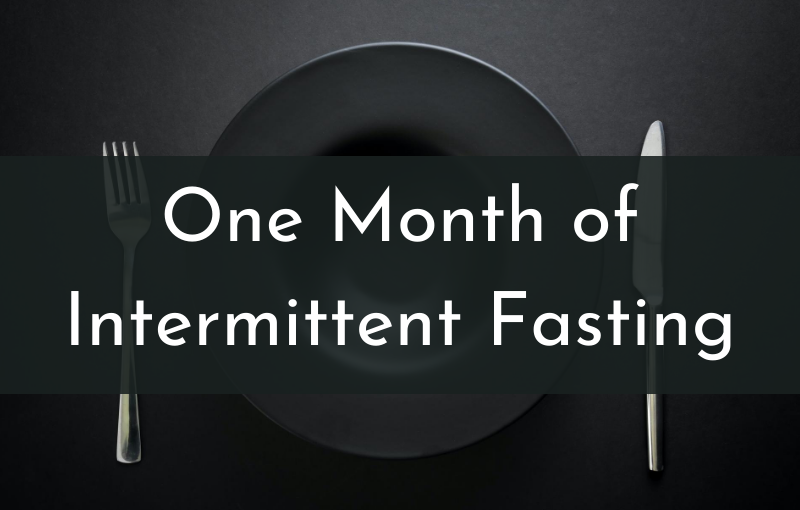We’ve always been told that breakfast is the most important meal of the day. But could skipping it actually be good for us and help us keep off weight?
Proponents of intermittent fasting think so.
Intermittent fasting is a diet that involves fasting for most of the day and eating within a limited window.
Although there are other types of intermittent fasting, many people who follow the diet fast for sixteen hours and spread their meals over eight (known as 16/8 fasting). They often do this by skipping breakfast and eating in the afternoon rather than when they first wake up.
Having black coffee instead of your usual eggs and toast will cause some pretty significant hunger pangs at first. But if you can overcome them, you’ll experience a number of health benefits from skipping breakfast.
Let’s take a look at realistic intermittent fasting results after just 1 month and beyond according to experts!

In your first month of intermittent fasting, you may shed a few pounds without having to count calories. Your insulin levels and triglycerides may also go down, and you might also notice that your blood pressure is lower.
Your inflammation levels are also likely to go down after a few weeks of fasting. And although you would think skipping meals would make you grumpy, once you adjust to going without food for longer periods, you’ll get a significant mood and energy boost.
To get a better understanding of the benefits of 1 month of intermittent fasting, I interviewed a group of fitness and nutrition experts. Keep reading to see what they had to say.
Weight and fat loss (without muscle loss)
Shortening your eating window revs up your metabolism and makes it easier to cut calories.
That’s why most people lose weight during their first few weeks of intermittent fasting.
Sofia Norton, a registered dietician and writer at KissMyKeto.com, told me:
“After a month of IF, you should expect at least some amount of weight loss—probably around 2-8 pounds if you lose weight at a steady rate. That’s because IF prolongs your body’s fatty acid oxidation stage, more commonly known as the fat-burning stage.”
Norton went on to explain that our bodies use glucose for energy when we’re eating, but switch to burning fat when we’re in a fasted state, like during sleep.
Intermittent fasting puts you in that fat-burning stage for longer, which often leads to weight loss.
Intermittent fasting can also help you reduce the number of calories you’re consuming because you’re eating in a smaller window.
Although they weren’t trying to restrict their calories or lose weight, participants in a recent study ate 350 fewer calories just by limiting their eating to 8 hours per day.
As a result, they lost 3% of their body weight in 12 weeks, which is great considering they weren’t counting calories.
But the best part of intermittent fasting is that you’ll be able to shed pounds without losing much muscle.
Norton told me that fasting for short periods only burns fat, not muscle, and doesn’t put you in starvation mode like a typical diet might.
Short fasts don’t slow down your metabolic rate either, she said. A recent study even showed that fasting for 48 hours can actually increase it by up to 14%.
Keep in mind that you’ll still have to be mindful about what you eat. You won’t be able to eat lots of fast food during your eating window and still lose weight.
But if you’re looking to shed pounds without having to count calories religiously, then intermittent fasting may be a good option for you.
Lower triglyceride and blood sugar levels
There’s also evidence that intermittent fasting lowers your blood sugar and triglyceride levels.
“You may notice the first initial changes in how your metabolism is working after your first month: fewer sugar crashes, more energy, lower triglycerides, and better glycemic response, said Norton.
Studies have shown that intermittent fasting can lower your blood sugar by 3% to 6% percent and reduce fasting insulin by as much as 31%.
This big drop in insulin may decrease your risk of developing diabetes.
Intermittent fasting—specifically the 5:2 diet—may also prevent you from developing heart problems by lowering your triglycerides.
The 5:2 diet involves restricting your calories to 600 two days per week and eating a healthy diet for the other five.
Compared to regular calorie-restricted diets, the 5:2 diet lowered non-fasting triglyceride levels by 40%.
So if you want to keep your body in top shape and prevent serious health problems down the line, intermittent fasting may be worth looking into.
Less inflammation and oxidative stress

Chronic inflammation has been linked to many diseases, including arthritis, cancer, diabetes, and asthma. But intermittent fasting could help fight it and prevent you from developing health problems.
According to Dr. Chris Norris, founder of Sleep Standards:
“Intermittent fasting could decrease several markers of inflammation and may be useful in treating inflammatory conditions, such as multiple sclerosis.”
Research has also shown that intermittent fasting reduces inflammation.
A recent study found that intermittent fasting lowers the number of monocytes in the blood, which is a type of cell that causes inflammation. It also makes the remaining monocytes less harmful and inflammatory.
Short-term fasting has also been shown to reduce oxidative stress, which plays a role in aging and diseases like Alzheimer’s and Parkinson’s.
You can’t see or feel inflammation, so you may not notice any changes in your body.
But after a few weeks, your inflammation levels will likely decrease and continue to improve the longer you follow the diet.
Lower blood pressure
Another benefit of short-term fasting is that it lowers your blood pressure.
Glynn Willard, a personal trainer and founder of GymFailedYou.com, said that you’ll notice a slight drop in your blood pressure after just a few weeks of incorporating fasting into your routine.
Research has also shown that fasting can lower your blood pressure quickly.
In one study, participants restricted their eating to an 8-hour window for 12 weeks. By the end, their systolic blood pressure had dropped by 7%.
Although your results may vary, you can probably expect a modest decrease in blood pressure after fasting for a month, which is a great incentive to stick with it.
More energy and better mood
You would think that eating less often would leave you feeling tired and grumpy.
But intermittent fasting can actually increase your energy levels and boost your mood.
Brendan Lee, a qualified sports coach and marathoner, told me that although there’s an adjustment period, our bodies run just as well in a fasted state, if not better.
“As you burn body fat during the fasted hours, you lose weight, and fats are also a longer lasting and slower burning source of energy too. After the first month, you might find you actually have less energy if you start eating breakfast again!” said Lee.
Jamie Hickey, ISSA certified personal trainer and nutritionist, also experienced a number of benefits from switching to intermittent fasting.
“Aside from the weight and fat loss benefits (during my first three months of fasting I lost 22 pounds of weight), intermittent fasting has significantly improved my ability to focus and get important things done, my quality of sleep, happiness and much more,” he said.
There’s even evidence that short-term fasting may help people with depression because it causes the body to release more ghrelin, which is a hormone that has mood-boosting effects.
Just like any other diet, intermittent fasting may not work for everyone. But because of its many potential benefits, including improved mood and energy levels, it’s worth trying out.
Wrapping Up
Although skipping meals seems like it would be bad for you, there’s strong evidence that it can actually improve your health when done right.
Intermittent fasting can help you shed pounds and burn fat without losing muscle.
It can also improve your health by reducing the inflammation in your body and lowering your blood sugar, triglycerides, and blood pressure.
You’ll likely go through an adjustment period as your body learns to go without food for longer periods of time.
But if you gradually increase your fasting time, you’ll have a smooth transition and come out on the other side with more energy and better health.
If you’re new to intermittent fasting, check out an example intermittent fasting meal plan right here.
And check out more of my guides to what you can accomplish in one month of HIIT, CrossFit, cupping, or running.